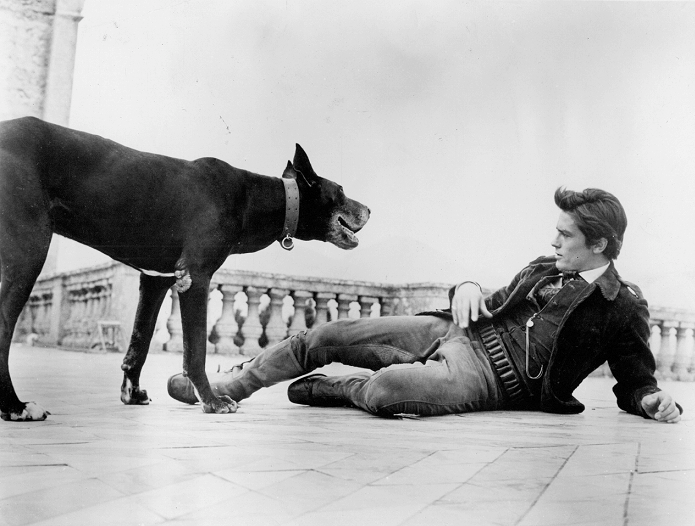
Alain Delon – Actor Superbe & Sacred Monster Turns 85. A Hommage
A man is born lonely, lives lonely, and dies lonely.
Alain Delon
Summer 2001- my good friend Cem comes to visit me and hang around, but I tell him that I have to pick up something important quickly and ask him to come with me. ‘Quickly’ meant to drag him to the end of the city with several buses for one and a half hour until I was holding the object of desire in my hands: a beautiful vintage book by Philippe Barbier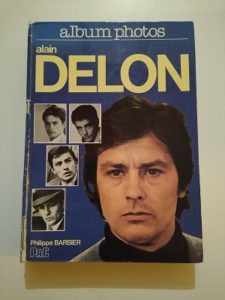 with over 600 photos and film stills of Alain Delon that I picked up in a remote store selling antiques in the middle of nowhere. That Cem was homosexual saved me, so when he took a deep breath to lash out at me for wasting his time, he suddenly stopped and had a look at the book’s blue cover, „What a handsome bastard!“ and melted. On the bus drive back, we looked at each page and each photography together while passing by the rural lowlands with its hot shimmering air and the chirping of insects, above all the smell of tires. It was a wisely spent afternoon, an elaborate moment of memory-making, all sensually tied to my beloved Alain.
with over 600 photos and film stills of Alain Delon that I picked up in a remote store selling antiques in the middle of nowhere. That Cem was homosexual saved me, so when he took a deep breath to lash out at me for wasting his time, he suddenly stopped and had a look at the book’s blue cover, „What a handsome bastard!“ and melted. On the bus drive back, we looked at each page and each photography together while passing by the rural lowlands with its hot shimmering air and the chirping of insects, above all the smell of tires. It was a wisely spent afternoon, an elaborate moment of memory-making, all sensually tied to my beloved Alain.
Other friends made other experiences: some of them would call or visit me and then discover that I was binge-watching Delon flicks whilst smoking on my bed. Others got mix-tapes with pictures of Delon that I cut out from magazines as cover. But I rarely talked about him, treasuring him like a twisted, delicate secret. It is very easy to revel in that Alain Delon is a beautiful man, and to disrespect his tremendous qualities as actor with that one-dimensional assessment. An actor and objet d’art like Delon deserves more than being the pinup of hordes of women, in one line with actor-models like the Brad Pitt’s of this world. Dignity is reciprocal, you should be careful to not take it away from somebody who does not ask for it. And if beauty is a breathing organism living from the personality treats of the inhabitor, then one has to take a deeper look at what makes the cruel beauty and complex grandezza of Delon.
A more male look at Delon seems more rewarding. My admiration for the French actor started with around ten years, when there were just two men in my life, my father and Elvis. The one not living in Memphis had a chest with two drawers packed with about one hundred self-recorded video tapes with handwritten labels on them which said “Old Gangster Film”, “Noir”, “Black and White Film”, “French Cop Film” or simply “Bronson” or “Delon”. Only he would understand the system of organization and alternate titles and know which films were on the single video cassettes, while my mother would fight over that small personal refuge of his, trying to annex it with her sewing and knitting kits with a mind-blowing persistence and impertinence.
Proud to say that my father’s drawer stood where it was until long after the end of VHS. I remember many afternoons watching these films with him in silence and without pedagogical follow-up conversations. We became the stoic men in those old black and white crime and noir films or Sergio Leone Westerns in sepia. One day it was a film called Le Samouraï that we watched. The film was an anomaly even within the most exquisite selections of the genre. Delon’s cold and unemotional delivery paralyzed me, and he looked like an uncomedic caricature in his fedora and trench coat. Immediately 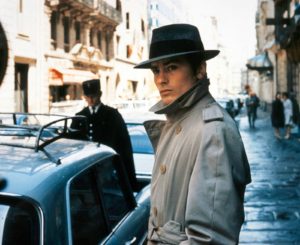 iconic. I was looking at a killer with dead blue eyes, watery like blotted paper, gracing the screen with his glacious presence and seemingly untouched by it all, but moved by an anonymous compassion. An ice-cold destructive angel in a dreamlike, somnambule state that blurred his beauty, making it tolerable. I was looking at a screen killer that had something disturbingly real about him. It was an intense viewing experience that would repeat itself years later when I watched Purple Noon for the first time.
iconic. I was looking at a killer with dead blue eyes, watery like blotted paper, gracing the screen with his glacious presence and seemingly untouched by it all, but moved by an anonymous compassion. An ice-cold destructive angel in a dreamlike, somnambule state that blurred his beauty, making it tolerable. I was looking at a screen killer that had something disturbingly real about him. It was an intense viewing experience that would repeat itself years later when I watched Purple Noon for the first time.
Born on 8 November 1935, Delon had a rocky childhood with his parents divorcing when he was just four years old, “I understood early on what rupture, abandonment and loneliness meant… I was only 4 years old when I realized that you could be abandoned by those you love the most,” Delon resumed in 2018. His parents sent little Alain to a foster family which lived in front of the Fresnes high-security prison. After his foster parents got killed, he moved back to his biological mother Édith and visited a couple of boarding 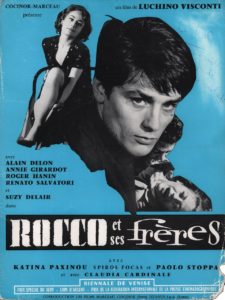 schools from which he was frequently expelled before quitting school at 15. He worked in his step-father’s butcher shop, which might have been the perfect preparation for him to join the marines with 17. Still a minor, his parents must give their consent and do not hesitate to send him to war. Delon served in Indochina and fought in the infamous Battle of Dien Bein Phu in 1954. Legends and myths about savagery, killings, and bisexual excesses surround his time in the military from which he was dishonorably discharged. His superior, Henri Guy de Vignac, said about Delon: “He was a sadist, a boy who enjoyed killing, a sexual pervert.”
schools from which he was frequently expelled before quitting school at 15. He worked in his step-father’s butcher shop, which might have been the perfect preparation for him to join the marines with 17. Still a minor, his parents must give their consent and do not hesitate to send him to war. Delon served in Indochina and fought in the infamous Battle of Dien Bein Phu in 1954. Legends and myths about savagery, killings, and bisexual excesses surround his time in the military from which he was dishonorably discharged. His superior, Henri Guy de Vignac, said about Delon: “He was a sadist, a boy who enjoyed killing, a sexual pervert.”
One year after his discharge in 1956, he attended the Cannes Film Festival and got discovered there because of his good looks. Delon was offered several movie roles that were the onset to a career that started as a “French James Dean”, but quickly developed into a huge international career where he became a sex symbol and face of the nouvelle vague, performed for auteurs like Louis Malle or Luchino Visconti in some of the best 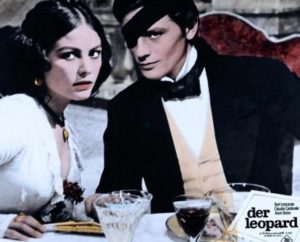 films of all times (The Leopard), and acted in countless high-quality crime and neo noir films. When working the first time with the master of the genre, Jean Pierre Melville, Delon created his trademark character for his role in Le Samouraï (1967): the calm and psychopathic gangster with an austere wickedness. His mysterious past might have helped, „I played it so well because I was the Samouraï.“
films of all times (The Leopard), and acted in countless high-quality crime and neo noir films. When working the first time with the master of the genre, Jean Pierre Melville, Delon created his trademark character for his role in Le Samouraï (1967): the calm and psychopathic gangster with an austere wickedness. His mysterious past might have helped, „I played it so well because I was the Samouraï.“
Reality and cinema merged in Delon’s life, who was obsessed with weapons and loved to surround himself with figures from the underworld who were his friends long before he became an actor. Delon became one of the dazzling and tragic-comic advocates of the underworld, who, contrary to the glorifications of “honor, male friendship and loyalty”, expose it as a degenerate and homoerotic-sadistic den of iniquity.
Two years after Le Samouraï, Delon got involved in a massive scandal while filming the sizzling La Piscine (The Swimming Pool) with his ex Romy Schneider: his bodyguard and friend, Stefan Markovic, was found shot to death, his body left in a garbage dump. According to Wikipedia. Markovic was known for his orgiastic parties where he allegedly set up cameras in the bedrooms to blackmail the upper class guests with compromising photos, “Some of these photographs would be alleged to be directly targeting Delon and his gangster friend Marcantoni themselves. H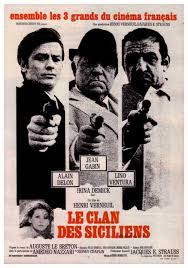 owever, the most important photos that Marković supposedly possessed were scandalous shots of Pompidou’s wife. That was a major concern to Pompidou, who was preparing to run for president. On 1 October 1968, Marković’s body was found”.
owever, the most important photos that Marković supposedly possessed were scandalous shots of Pompidou’s wife. That was a major concern to Pompidou, who was preparing to run for president. On 1 October 1968, Marković’s body was found”.
Markovic had also been hired by Delon to monitor his cheating wife Nathalie Delon. The surveillance ended with Nathalie seducing Markovic and playing tapes of her sexual encounters with him to her husband of world-star fame. But the entire sex, crime & corruption story had already started 3 years ago, on January 30, 1966, when another bodyguard of Delon, Milos Milosevic, died in the bathroom of actor Mickey Rooney from a bullet. Milos was the partner of Nathalie Barthélémy- later Nathalie Delon. Alain Delon, who was filming Texas Across The River in Hollywood, was a guest at Milos’ house in the Rooney mansion on the night of the murder. Both murder cases were never solved.
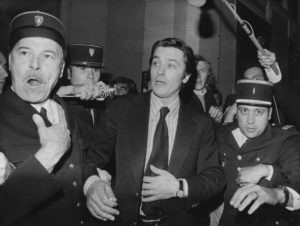 Delon came under investigation because of a letter written by Marković to his brother, saying that if any harm came to him, the police should get in touch with Delon and Marcantoni, implicating them to be „1000%“ guilty. Another reason were the never-ending rumors about Delon’s bisexuality and supposed compromising photos that showed him in homosexual acts. Asked by a reporter about his alleged affairs with men, Delon replied: „So what’s wrong if I had? Or I did? Would I be guilty of something? If I like it I’ll do it. If you like your goat, make love with your goat. But the only matter is to love.“ Statements and behaviour like this should be kept in mind when nowadays Delon is being labeled a homophobe because he objects on same-sex couples having children. Romy Schneider told her former co-star Karlheinz Böhm in 1960 that Delon was bisexual, that she had caught him in bed with a man and that she had tried to kill herself because of that.
Delon came under investigation because of a letter written by Marković to his brother, saying that if any harm came to him, the police should get in touch with Delon and Marcantoni, implicating them to be „1000%“ guilty. Another reason were the never-ending rumors about Delon’s bisexuality and supposed compromising photos that showed him in homosexual acts. Asked by a reporter about his alleged affairs with men, Delon replied: „So what’s wrong if I had? Or I did? Would I be guilty of something? If I like it I’ll do it. If you like your goat, make love with your goat. But the only matter is to love.“ Statements and behaviour like this should be kept in mind when nowadays Delon is being labeled a homophobe because he objects on same-sex couples having children. Romy Schneider told her former co-star Karlheinz Böhm in 1960 that Delon was bisexual, that she had caught him in bed with a man and that she had tried to kill herself because of that.
Romy also tried to kill herself after Delon left her for Nathalie, ending an almost 5 year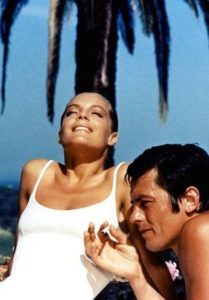 long feverish love story and engagement with the German actress with a bouquet of red roses and a note, “I’m in Mexico with Nathalie. All the best. Alain”. The actress Nathalie Barthélémy was already pregnant by Alain, half a year later she was his wife. Romy still kept Alain in high regards, remembering him as the man to whom she owes most: “The most important man in my life is and always will be Alain Delon. He is always there when I need a shoulder to cry on… even today Alain is the only man I can count on. He would always help me. Only Alain shaped me as a woman.” It was Delon who empowered his lover, the former actress of homeland-films like “Sissy”, to new levels and heights. He introduced her to the Parisian Bohème and brokered her an engagement with Luchino Visconti, helping her transform to a modern woman and serious actress that went on to work with directors like Claude Sautet and Orson Welles. Romy is the one woman we have to consider when Delon is accused of being a “sexist and bigoted anti-feminist” like in 2019, when Cannes decided to award an honorary Palme d’Or to the French actor, described by the festival’s website as “a sacred monster, a living legend, a planetary icon”.
long feverish love story and engagement with the German actress with a bouquet of red roses and a note, “I’m in Mexico with Nathalie. All the best. Alain”. The actress Nathalie Barthélémy was already pregnant by Alain, half a year later she was his wife. Romy still kept Alain in high regards, remembering him as the man to whom she owes most: “The most important man in my life is and always will be Alain Delon. He is always there when I need a shoulder to cry on… even today Alain is the only man I can count on. He would always help me. Only Alain shaped me as a woman.” It was Delon who empowered his lover, the former actress of homeland-films like “Sissy”, to new levels and heights. He introduced her to the Parisian Bohème and brokered her an engagement with Luchino Visconti, helping her transform to a modern woman and serious actress that went on to work with directors like Claude Sautet and Orson Welles. Romy is the one woman we have to consider when Delon is accused of being a “sexist and bigoted anti-feminist” like in 2019, when Cannes decided to award an honorary Palme d’Or to the French actor, described by the festival’s website as “a sacred monster, a living legend, a planetary icon”.
The other woman we have to consider is Nico, the iconic supermodel, actress and musician, best known for her singing on Velvet Underground and Nico. If the Delon-Schneider love was a glamorous and passionate Amour fou ending with tears and suicide attempts, his brief affair to German icon Nico was an “Amour Cruel”, a one-night stand with disproportionately tragic consequences. The two met in Ischia, where Delon was in the production of a movie in which Nico was supposed to play a part. Nico got pregnant after sleeping with Delon just once, and later was threatened by Delon’s underworld friends when she tried to contact the unborn baby’s father. Nico gave birth to their son Ari, and failed horribly as mother. The little child grew up at parties, drinking the leftover drinks of party guests every night, taking amphetamines at the age of 4 after confusing the pills with candy, spending the nights with strangers while his mother forgot him at parties. With 16, Ari started to share the heroin and syringe with his mother.
with disproportionately tragic consequences. The two met in Ischia, where Delon was in the production of a movie in which Nico was supposed to play a part. Nico got pregnant after sleeping with Delon just once, and later was threatened by Delon’s underworld friends when she tried to contact the unborn baby’s father. Nico gave birth to their son Ari, and failed horribly as mother. The little child grew up at parties, drinking the leftover drinks of party guests every night, taking amphetamines at the age of 4 after confusing the pills with candy, spending the nights with strangers while his mother forgot him at parties. With 16, Ari started to share the heroin and syringe with his mother.
By now one should be able to guess that Delon’s punishment for an unwanted child would be most cruel and outlast the death of Nico: to this day (with 85 years) he denies paternity to Ari Boulogne, who looks very much like his famous father. Instead, father and son have the legal status of “half-brothers”: Overwhelmed by motherhood, Nico contacted Delon’s mother Èdith Boulogne, who recognized Ari Boulogne as her grandson and took him with her to raise him in France. She adopted Ari against the will of her son Alain, of whom she in 1984 said, “I think my son is as evil as I am good… When he does something stupid, then everybody has to pay for it… All of the people, important or not important to him, who come close to my son get damaged.”
When Nico got close to her son Alain, he was filming the brilliant and menacing 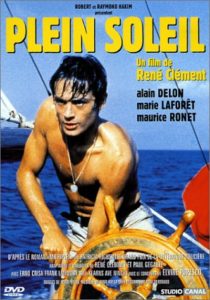 Plein Soleil (Purple Noon), where he played the role of Patricia Highsmith’s sinister Tom Ripley, a con artist and parvenu taking over other people’s lives, a cultivated criminal and serial killer who manages to evade justice. Ripley feels regret but no guilt, since he doesn’t kill unless it’s “absolutely necessary”, and he is capable of feelings of genuine affection and love. Alain Delon might be described as „Tom Ripley if Tom Ripley had been real“. In the sense that he is a Ripley who did not have to envy and strive for other’s lives, but had a great, full life of his own, albeit only complete with the void left by a damaged and loveless childhood. It was a life that granted Delon love and passion and a most successful career where he could channel some of the evil and wicked aspects of his personality in his stellar performances on screen- some of them.
Plein Soleil (Purple Noon), where he played the role of Patricia Highsmith’s sinister Tom Ripley, a con artist and parvenu taking over other people’s lives, a cultivated criminal and serial killer who manages to evade justice. Ripley feels regret but no guilt, since he doesn’t kill unless it’s “absolutely necessary”, and he is capable of feelings of genuine affection and love. Alain Delon might be described as „Tom Ripley if Tom Ripley had been real“. In the sense that he is a Ripley who did not have to envy and strive for other’s lives, but had a great, full life of his own, albeit only complete with the void left by a damaged and loveless childhood. It was a life that granted Delon love and passion and a most successful career where he could channel some of the evil and wicked aspects of his personality in his stellar performances on screen- some of them.
by Saliha Enzenauer

Love to read his life story,can you recommend the best English language biography on the actor,thanks for the marvelous piace on his
He had never admitted that he was bisexual. That’s just rumor. Romy never told that but her mother who hated Delon — did.
hallo
interesting about a man who stares himself as he is in the noirs and the countless iridescent rainbow where he led a double life and enjoys his own interlude of his own self as he is Alain Delon – a lonely, sad depraved figure who walks alone, lives alone and is cold and calculating sometimes happy with his face with what it can do for him – and sad to the extremes with again what his face could do for him as he realizes that he has sufficient intelligence to shine, Le Samourai was himself – living in the dark shadows and doing what he wants and when he pleases; a shadowy figure as he himself is – Delon seems to suffer from an acute PTSD with no feelings whatsoever to the others only his own – murder, perversion, sadism maybe even a touch of hatred folklore touches down..He would never seek psychiatric help nor will he want to forget his penchant for killing in the raw plains of the underground in Vietnam where he was a real sadist – a sexual predator inflicting pain and terror on the defensive side and committing crimes…killing – by his own words – to kill or to be killed….but he committed more and most probably lived to regret it but with a man like him with no love or so he is indeed a very sad, broken and living his own ordeals….bells are ringing as he is talking about suicide. You poor dud Alain living in such disastrous conditions, betrayed by those who you loved and now finding out that all that glittered were never gold – but still you are a legend and we will miss you when you go…rest in peace and may you find the love that illuded you.
Wahnsinns Story!
The Tom Ripley comparison is spot on, they even share the homo erotic aspects. Fascinating story, most of these facts were new and very surprising to me. Nico and Delon! I never knew she had a child, which maybe tells it all about her motherhood…
Hi Saliha. How fascinating story, I didn’t know much about him. I think it was fortunate for all that he became an actor. The Nico connection was new to me.
Your father’s lable system is absolutely fantastic. I hope you’ve been well there.
Hi Mika, it seems like the VHS labels of my father are the true star of my story, that’s wonderful! I’m happy you enjoyed the story, there are many things that I left out like the 36 dogs Delon has buried in his garden, because “dogs are the only friends that have never betrayed me”. He even has a chapel on his ground for these dogs, it seems like he is the male equivalent of the crazy cat lady Brigitte Bardot. We’re looking forward to a second lockdown and a WW2 bob was just found in my quarter so 13000 people have to get evacuated… other than that all is fine, lol. Hope you are good, too!
Saliha,
Alain Delon captivated me by his performance in “Le Samouraï”. Initially, I related him to a kind of James Dean, but later I realized that he was something else, there was something intimidating and mysterious inside him. Delon’s wonderful work with acclaimed auteurs is something that must be highlighted: Melville, Malle, Visconti !.
Now, I am glad that your tribute is so well analyzed and free of prejudices, it is immediately noticeable that you are an analytical and faithful follower. Your early labels on your father’s VHS collection are simply lovely treasures.
There were many aspects that I didn’t know about Delon’s life, but one of the things that caught my attention was the Nico’s part, incredible!
Nico is a woman who is constantly praised for her album with The Velvet Underground, but many forget to mention the prodigious gems of her solo career, such as “Desertshore” and “The Marble Index”. And now that I think about it, it seems to me that Nico inspires the same mysticism as Delon.
Anyway, the quote at the beginning is fantastic, life flows through those words.
Congratulations, this is a marvelous tribute.
Hi Octavio, he’s had a tremendous career with many high-quality arthouse roles, which is something hard to do with a pretty face. What you say about Delon and Nico is interesting, that they inspire the same mysticism in different ways. There’s something to that if I think of it. Nico played with lies to elude her true story, and there is a darkness at her core that we cannot easily grasp. Same goes to Delon. That being said, I am not surprised a bit that people don’t know about the Nico connection of Delon, having fathered her child. Nico is being written out of music history. She is an artist that I admire a lot and truth is that if Nico had been a man or a woman with old superstar ways (Nico basically invented the anti-superstar), then she would be celebrated as avantgarde hero and one of the few artists who knew how to use their voices as instruments instead of being belittled as crazy junkie. Thinking about Syd Barrett and others… Nico’s Marble Index, Desertshore and The End are among the most interesting, mysterious, haunting records of all times, she is connected to ancient times and rituals.
Romy Schneider was one stupid lady. He was and is an ass, now also cuddling up with the far-right.
Hey, Romy lived in Cologne and I saw her in quite some German talkshows- I honestly never thought of her as being particularly stupid. She did a cringeworthy interview with Alice Schwarzer though. Pretentious as hell
Saliha,
Alain Delon is one of my favorite actors (my favorites of his performances are in Luchino Visconti’s The Leopard and Jean-Pierre Melville’s Le Samourai and Le Cercle Rouge). You’ve written a comprehensive, detailed, fantastic tribute to one of the greatest actors in cinema history.
Thank you Mark, also one of my favorite actors, if not my favorite… All three films you mention are unparalleled masterpieces.
I don’t know how to begin. And true celebration of an artist from a fan who saw more than a pretty face.
You article/ tribute to the great man revealed both the corruption and the artistry of Delon. I had to laugh out loud as I pictured your day-long adventure tracking down the object of your desire. A book! And those early labels on Father’s VHS collection. Just perfect.
Thank you for showing us the true Alain Delon. Not a sanitized version that we so often get.
Maximus Adonis ♥️
I don’t know who the true Delon is, and probably nobody does. Despite his unquestionable status as superstar, Delon is actually one of the top ten most hated public figures in France, and being critisized quite regularly. When I hear that he’s being critisized for sexism, I’m left thinking “he’s done far worse things why do they concentrate on this” I guess it’s a clumsy attempt to somehow get a grip on ths mysterious man and bring him to justice… But one thing is sure, nothing can take his career and outstanding performances and iconic status in movie history from him.
I didn’t know that he had a child with Nico!!!
Fatal Attraction 😮
Hello
good evening…i have read with utter interesting views about Delon. For some unknown reason when I was a kid I had always pictured him with a black cloak covering his grave or himself…. growing up watching a few of his remaining films, collecting some of his photos, which solely captured the essence of his youth and beauty, with those hypnotising Scorpio eyes something told me that
Alain was either gay or bisexual…Alain had many meanings each time i saw him it was in different lights….but i have never pictured him to be innocent and guilt free… many of times the answer were all there….in the film noir and the rainbow’s lights Alain Delon seemed living his life, the way he was making his movies…i have captured his longing for the love of the others’ love and life, things that he has never been able to live through and recreate, but more to it, i believe that he is trying to find out the true role of his life and his own identity, which does not cover up crimes, illicit bisexual behaviours and just maybe women who would love her and not guys who served his sexuality perfectly. Sad as it might be…Delon deserves the best unfortunately in his quest to surviving and to find his own identity – he confuses literally the reality and the film industry…where his life portrays himself in various and different shades…which one would be conclusively related or by the same token what we see in the movies is the real sadomasochistic Alain. thank you….it was nice for you to allow me to say something that has been with me for years…your tribute was terrific…the sum of alain delon fears. hugs…Filomena.
Delon has some dark secrets I was not aware of. Great story!
I always thought that he’s just some sex symbol. What a life story